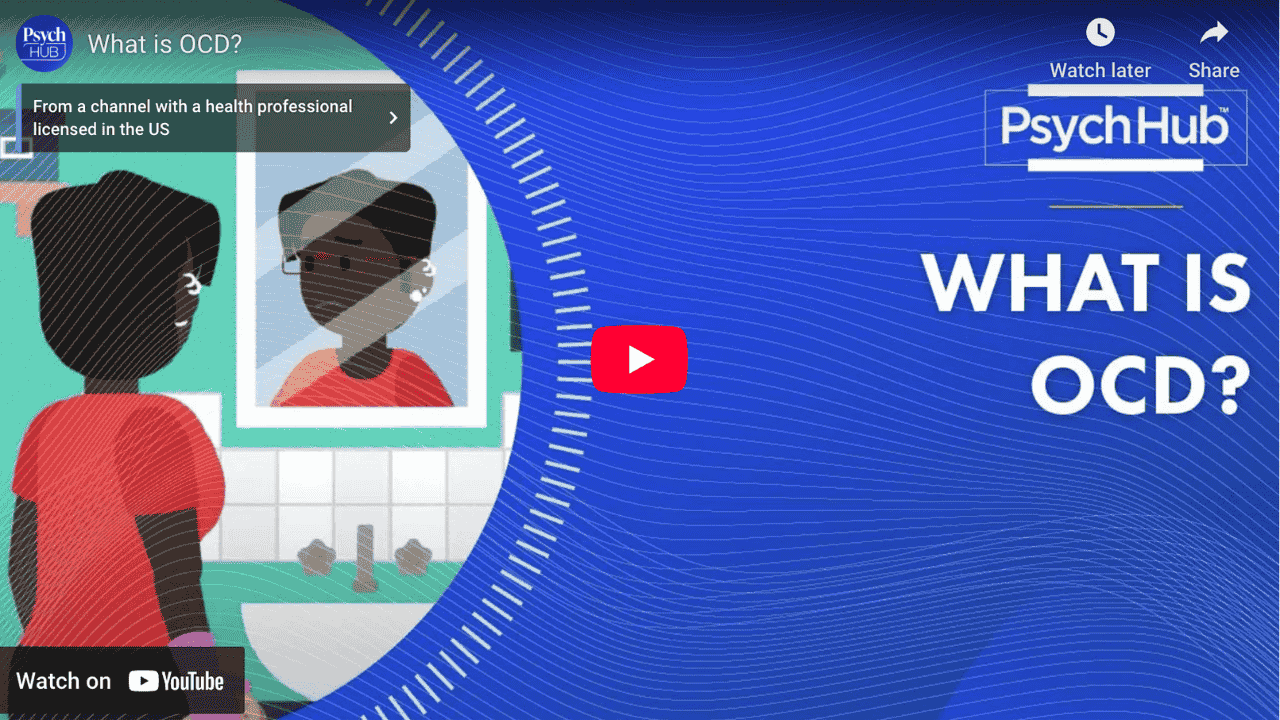Could my thoughts be OCD?
Updated: April 28, 2025
What are Intrusive Thoughts?
Did you know that most people have intrusive thoughts at times including the therapist writing this very page? And yet, it can take people up to 8 years to reach out for help for their OCD because of feelings of shame and guilt.
A thought is just a thought and the more energy that you give it, the more powerful it becomes. It can start to feel like you are in a vicious cycle of unwanted intrusive thoughts and behaviours or rituals to try to counteract them.
What is OCD? Source: Psych Hub
Common OCD symptoms include:
Fear of contamination or “cleaning OCD” (e.g. I could get sick from these germs, I could die, I could get others sick and they could die). Learn more about contamination OCD.
Fear of harming yourself or other people (e.g. What if I stab my partner? What if I hurt my baby? Did I run someone over with my car?). Learn more about a specific type of harm OCD, called Hit-and-Run.
Ordering and trying to make things appear symmetrical.
Checking behaviours (e.g. checking appliances, doors, hair straighteners, etc.).
Sexual obsessions (e.g. sexual thoughts about children, animals, combining sex and religion, incest, and sexual behaviour contrary to your sexual orientation). Learn more about OCD sexual obsessions, pedophile OCD (POCD), and Sexual Orientation OCD.
Doubting yourself (e.g. does having this thought mean it’s true? I can’t be trusted around people. What if I forgot to turn the oven off? What if I didn’t clean my hands properly? What if my partner isn’t “the one”?). Learn more about Relationship OCD (ROCD), a form of OCD where you doubt your partner (E.g. are they cheating on me? Is there a better person for me?).
Difficulty tolerating uncertainty (e.g. I have to know for sure if I turned the oven off).
You engage in rituals to help keep you safe or to reduce your anxiety associated with the obsessions. Examples of rituals: are washing, checking, pushing your thoughts away (thought suppression), getting reassurance from a loved one, searching the Internet for information, etc.
The difference between OCD and real urges is that the thoughts cause you distress, shame and guilt (and they are contrary to your values; in other words, you would never act on your thoughts or images). Learn more about postpartum or perinatal OCD.
OCD in Teens
OCD may look different in kids and teens.
Learn more about the signs and symptoms of OCD in teens.
Meet our teen therapists.
Recommended Books for OCD:
Getting Over OCD, Second Edition: A 10-Step Workbook for Taking Your Life Back (Abramowitz, 2018)
Treating your OCD with Exposure and Response (Ritual) Prevention, 2nd Ed (Foa & Lichner, 2012)
However, we suggest that you skip any chapters that teach you thinking skills (unless you refuse to do exposures) because people with OCD tend to use them as rituals more often than not (which can make OCD worse in the long term). You can also work through this workbook with a trained therapist. Check your benefits to see if you are covered to see a psychotherapist, social worker or psychologist.
OCD Treatment
Fortunately, there are effective treatments available for OCD. Cognitive-behavioural therapy (CBT), particularly a form known as Exposure and Response Prevention (ERP), is considered the gold standard. Medications such as selective serotonin reuptake inhibitors (SSRIs) are also commonly prescribed to manage symptoms. Individuals with OCD need to work closely with mental health professionals to develop a personalized treatment plan.
5 Tips if You Suspect You Have OCD
Educate Yourself: Learn about OCD, its symptoms, and available treatments. Understanding your condition is the first step towards managing it effectively.
Seek Professional Help: If you suspect you have OCD, don't hesitate to reach out to a mental health professional. They can provide a proper diagnosis and recommend appropriate treatment options.
Practice Mindfulness: Mindfulness techniques, such as deep breathing or meditation, can help reduce anxiety and intrusive thoughts associated with OCD. Incorporating mindfulness into your daily routine can contribute to overall well-being.
Gradual Exposure: Gradually expose yourself to situations or triggers that provoke obsessions, while refraining from engaging in compulsive behaviors. Over time, this can help desensitize you to the anxiety associated with these thoughts.
Build a Support Network: Surround yourself with supportive friends, family members, or support groups who understand OCD and can encourage you during difficult times. Having a strong support network can make a significant difference in managing OCD.
Get connected with an ERP Therapist Near You
OCD is a treatable mental health condition with Exposure and Response Prevention (ERP) so please reach out today! Virtual CBT Psychotherapy has 5 therapists who have been trained and supervised in ERP: Alpar (Psychotherapist in Barrie), Celissa (Master’s Social Worker in Midland), Anneliese (Master of Social Worker in the Collingwood area) Alana (Master of Social Worker) and Dr. Steinhart (Psychologist in the Barrie area).
Our ERP therapists can provide therapy to anyone in Ontario (over the age of 12). Did you know that video or virtual ERP is just as effective as in-person? So why not start therapy from the comfort of your home from anywhere in Ontario?
Learn more about our expert OCD therapists in Ontario
Remember, you are not alone, and help is available.
References: American Psychiatric Association. (2013). Diagnostic and statistical manual of mental disorders (5th ed.). Arlington, VA: American Psychiatric Publishing.Ruscio, A. M., Stein, D. J., Chiu, W. T., & Kessler, R. C. (2010). The epidemiology of obsessive-compulsive disorder in the National Comorbidity Survey Replication. Molecular Psychiatry, 15(1), 53–63.Koran, L. M., Hanna, G. L., Hollander, E., Nestadt, G., Simpson, H. B., & American Psychiatric Association. (2007). Practice guideline for the treatment of patients with obsessive-compulsive disorder. Arlington, VA: American Psychiatric Association Practice Guidelines.

